Check out my first novel, midnight's simulacra!
Nuclear weapons
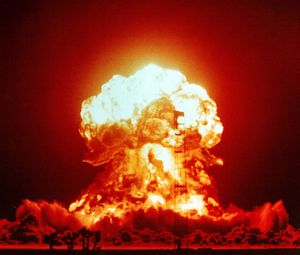
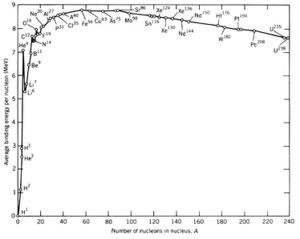
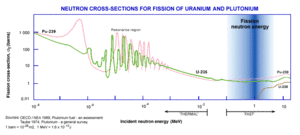
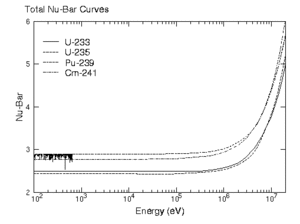
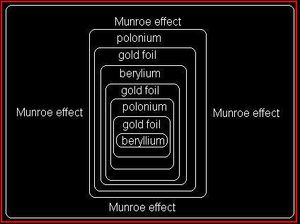
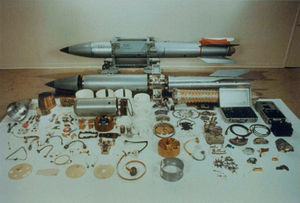
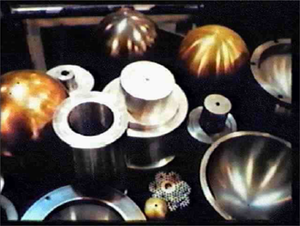
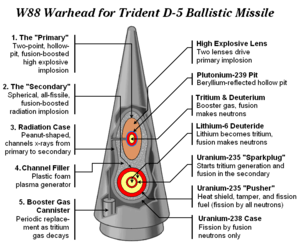
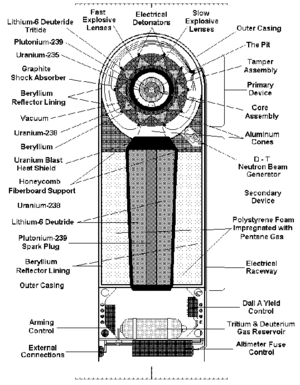
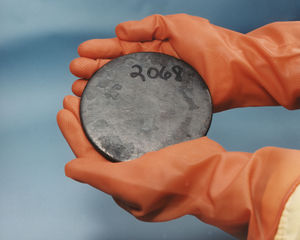
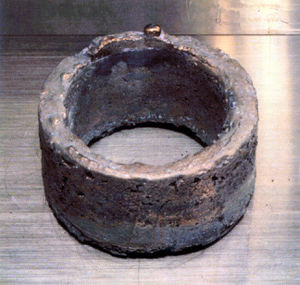
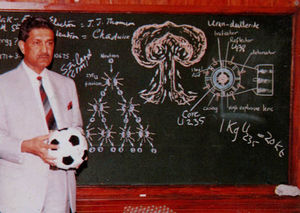

(12:08:06 PM) elizabeth warren: that'll get you on a list or three
Getting started in nuclear hobbyism is easier (and more fun!) than you likely think. WarGames taught us that computers and nuclear weapons are more interesting than dogs, parents, or Ally Sheedy (and more trustworthy than feelings). A computer program is simple interactions, tightly arranged, performed billions of times in the blink of an eye. A nuclear bomb is basically the same thing, but you can only run it once.
It's true that your modern criticality fetishist has a rough time of things. Since 2001-09-11, great stocks of (unclassified) information have been purged from US government sites. Various fellow travelers (see below) maintain partial archives. My recommendations are to follow The Making of the Atomic Bomb and The Los Alamos Primer (see "Books", below) with a few nuclear engineering and physics texts, at which point you'll be well-equipped to daydream about your own neutron initiator ideas and radical implosion symmetries. Don't be afraid to search through Russian papers; once you need to (you'll know when), they're sufficiently mathematically dense that you can follow along. The words are mainly just transitions anyway.
All is not lost. The boys at LANL and similar places haven't been able to do criticality experiments since the CTBT's signing, so it's a level (simulation-only) playing field. Today's supercomputer is tomorrow's slide rule; an HP48GX will certainly get you through spherically symmetric detonations, and a few GPUs form a fine platform for running your own hydrocodes. Relevant shockwave theory, metallurgy and nuclear constants have long existed in the public domain. Neutron sources sufficient to grill 233U from sheets of 232Th in one's backyard are advertised in every issue of Nuclear News or Physics Today (though watch out for 232U and attendant hard gammas!), while high-quality timing elements can practically be extracted from microwaves. The 2009 recession has left plenty of teenagers unemployed, and you can surely put them to work doing something.
When the going gets tough, just think to yourself: "If South Africa can do it, well dammit, so can I!"
Basic Physics
- Energy-mass equivalence - electron-volts - curve of binding energy - energy scales (chemical vs nuclear vs annihilative)
- Pressure - temperature - ideal gases - brownian motion - radiative ablation - ionization - plasmas
- The atom - the nucleus - periodic trends - size scales (e vs p vs n vs α vs large nucleus vs atomic radius vs molecular size)
- Stable and unstable isotopes - half-life / expected time to decay - odd-even mass differences
- Radiations (α, β, γ aka alpha, beta, gamma) - transmutations (there are many!)
- Shell models of the atom and nucleus - Coulomb potentials - Yukawa potentials
- Neutron absorption and scattering - fission probability - pre- and post-scission - Doppler broadening
- Neutron effect is a function of (a) incident neutron energy (b) many-body nucleon-nucleon forces and (c) luck
- Resonance with nucleus activation energies leads to preferring absorption over scattering
- An absorption might deform the nucleus sufficiently that a two-body Coulomb repulsion overpowers the binding force
- This is the probability of fissioning (Wfis), as opposed to merely emitting a γ-ray.
- Nucleon-nucleon forces are typically described in per-{isotope X fine structure} terms, ignoring hyperfine details
- Result: for a given isotope, there's a function taking {excitation level X neutron energy} to {first-order fission probability}
- Electrodynamics - strong nuclear force - weak nuclear force - quantum tunneling
- π-induced fission (π = pion, aka any of 3 π-mesons)
- Liquid drop model - superdeformation - hyperdeformation - compound nucleus
- Nilsson model - (two-humped) fission barrier - fission isomer
- Madland-Nix (Los Alamos) model - Prompt neutron multiplicity distribution P(ν) - prompt fission neutron energy spectrum - TKE
- TKE: Total Kinetic Energy (of fission fragments)
- Number of neutrons per fission ("nu-bar", ν) is a function of the particular breakup / fission fragments
- ...but can be averaged over inputs. In general, plutonium generates more neutrons than uranium, though 233U's not bad.
- "Monte Carlo Approach to Sequential Neutron Emission from Fission Fragments", LANL 2005
Reactor Physics/Fuel Cycle
- Natural materials available:
- Uranium. Terrestrial uranium ore of this epoch tends toward a 99.284% / 0.711% / 0.0058% 238U/235U/234U split.
- Thorium. For all purposes, entirely 232Th (look at the half-lives).
- No point in breeding up from lower Z's than 232Th - No meaningful sources of other actinides
- Neutron moderators - fueling - MOX - breeders - feedbacks - inherently safe designs
- Moderate to take advantage of upscaled Wfis function. Keep this in mind for "hydrides" below...
- Recycling - metal oxide fuel - reprocessing - fusion-driven waste fission
- Four-factor formula - criticality control - fuel burnup - fission products - fission poisons - 135Xe - 149Sm
- Intertial confinement fusion - hydromagnetic confinement fusion - cold fusion - bubble fusion
- Etienne Parent (2003). "Nuclear Fuel Cycles for Mid-Century Deployment".
- W. G. Sutcliffe and T.J. Trapp. eds. "Extraction and Utility of Reactor-Grade Plutonium for Weapons", Lawrence Livermore National Laboratory. UCRL-LR-I 15542, 1994 (S/RD).
- US DOE "Nonproliferation and Arms Control Assessment of Weapons-Usable Fissile Material Storage and Excess Plutonium Disposition Alternatives", 1997.
Fission Weapons
- Criticality - subcritical - supercritical - prompt criticality - critical insertion time - insertion (gun-type) method - spontaneous fission
- Implosion method - levitated pits - multi-point implosion
- 232Th - 233U - 235U - 238U - 249Pu - 240Pu - minor actinides - transuranics - fissile, fissionable, fertile
- Fission chain reactions release moderately energetic "fission energy" neutrons. They affect materials differently:
- 233U is fissile, and can be bred from 232Th. Without subsequent physical enrichment, however, it'll be contaminated to some degree by:
- 232U ((233U,n) -> 232U + 2n, (232Pa,β−) -> 232U), a retarded younger brother notable for meager lifespan and γ-rich decay chain
- Georgia Tech researchers have, however, recently fashioned 232UBe13 (232uranium beryllide) neutron initiators
- 235U is fissile, but requires enrichment infrastructure (no plausible breeding path). It's a real dream to work with, and easier to ignite than a Sparkler. Modern cores employ 239Pu due to (a) smaller critical masses (more energy per fission) (b) more intense neutron fluxes (more prompt neutrons per fission) and (c) metallurgists in search of big paychecks.
- 238U is not fissile, but can be bred into 239Pu. Furthermore, it can be fissioned by the 14.7 MeV neutron resulting from D-T fusion, and there's an absolute ton of it.
- 239Pu is fissile, and can be chemically extracted from activated actinides (primarily 238U breeding). Without subsequent physical enrichment, however, it'll be contaminated to some degree by:
- 240Pu becomes a 241Pu rather than compound {241Pu} (fission precursor), meaning two neutrons (and associated time) minimum to yield a possible fission event. Predetonation hazard due to spontaneous fissions. Burnable in a recycling reactor, but a weapon contaminant.
- 241Pu is highly fissile. Undesirable in weapons due to short half-life (α to useless 241Am).
- 242Pu is the Smerdyakov of plutonium, gone wrong every possible way. 242Pu ought neither be purchased nor accepted as a gift.
- Fission energy neutrons' effects generally follow those of thermal neutrons (probability of fission is generally reduced, but comparable).
- 233U is fissile, and can be bred from 232Th. Without subsequent physical enrichment, however, it'll be contaminated to some degree by:
- Enrichment levels - enrichment methods - degradation - downblending
- Observable properties of processing tech (plutonium's more intensely thermal)
- Robustness of methodologies/materials/geometries (eg easiest to make a big, wasteful, HEU gun bomb)
- Safety/reliability of materials/assemblies (Decay of Pu, tritium, polonium, neutron moderation by seawater, fire hazards)
- Prompt neutrons - delayed neutrons - fast neutrons - slow neutrons - neutron reflectors
- Neutron sources / initator design - Munroe Effect - Beryllium/Polonium urchin - pulsed neutron tubes - shock initators - UD3/TiD2
- High explosives - Taylor-Rayleigh instabilities - assembly geometry - neutron multiplications - Rankine-Hugeniot conditions
- Hydrides (see the Ruth section from Upshot-Knothole)
- Slowing the neutrons increases absorption probability, allowing more efficient explosion
- The additional interactions (not the reduced speed) take too long, though, and containment is lost
- "The B61-based Robust Nuclear Earth Penetrator: Clever retrofit or headway towards fourth-generation nuclear weapons?". Gsponer 2005-11-19.
Fusion Weapons and Boosting
- Hollow pit - DT infusion - dial-a-yield / FUFO ("full-fusing option") - lithium-deuteride - Li6 - Li7
- Layer-cake model - sparkplugs - Teller-Ulam design - stage chaining
- Core boosting - enhanced radiation weapons (neutron bombs) - fissionable jacketing
- Pure fusion weapons, clean weapons (non-fissionable jacket)
Engineering/Infrastructure
- Project Plowshare - Project Orion - Atoms for Peace - Project Rover
- Testing - test detection - treaties
- Criticality accidents - Weapon accidents - Oklo (Gabon) natural reactor
Delivery Systems, Effects
- Blast theory - shock front - double flash - optimum delivery altitudes
- Miniaturization - MIRV's - penetration aids - neutron fluxes
- Russian Strategic Nuclear Forces (2004, MIT Press) is awesome
Missile Defense
- "Anti-Ballistic Missile Systems." R.L. Garwin and H.A. Bethe. Scientific American, Vol. 218, No. 3, pp. 21-31, March 1968.
- Missile Defense Agency, with garish Flash as of 2008.12.27.
- Hans Bethe and Freeman Dyson both have some great material in their books; collect it
Maintenance/Lifecycle/Robustness
Test Detection/Treaty Enforcement
Simulation
See Also
- Carey Sublette's Nuclear Weapon Archive is peerless and the starting point for any research
- Gregory Walker's Trinity Atomic Web Site is a sister site
- The Garwin Archive at FAS is awesome
- The National Nuclear Data Center at Brookhaven National Laboratory
- The NRDC maintains a nuclear data archive
- LBNL's Isotope Project
- The Progressive's November 1979 issue, "The H-Bomb Secret" (for historical purposes)
- AFTAC flies out of Patrick AFB, Florida
- LANL's T-2 Nuclear Information Service
- globalsecurity.org has nice weapon system writeups
- GEANT4 physics reference manual, chapter 4 ("Hadronic Interactions")
- Richard Piccard's Notes on Ionizing Radiation and Modern Physics
Blogs
- Restricted Data: The Nuclear Secrecy Blog by Alex Wellerstein
- Arms Control Wonk
- Total WonKerr
- The Effects of Nuclear Weapons (this one gets a little crazy)
- Arms Control Otaku (no longer active)
Books
The following textbooks range from introductory to advanced material, and all require some basic physics and associated mathematical sophistication. For obvious reasons, textbooks on actual weapon design, testing, engineering and maintenance are difficult to come across. There's a wide variety of excellent books on political theory of nuclear weapons, which I'm unqualified to rate (update: Kahn's On Thermonuclear War is absolutely required reading). Consult your local university's political science department for more information.
- Dalton Borroso's The Physics of Nuclear Explosives almost makes things too easy.
- Zel'dovich's Physics of Shockwaves and High-Temperature Hydrodynamic Phenomena might be less direct, but covers more material than anything else.
- Hans Bethe's Basic Bethe ought be required reading for all people.
- Kenneth Krane's Introductory Nuclear Physics (assumes an undergraduate background in quantum mechanics)
- Weston Stacey's Fusion Plasma Physics (assumes a strong background in electromagnetics)
- James J. Dunderstadt's Nuclear Reactor Physics
- Robert Serber's Los Alamos Primer
- Glasstone and Dolan's The Effects of Nuclear Weapons is about as directly quantitative as one finds in the open literature, and freely available online.
- IANUS scientists Andre Gsponer and Jean-Pierre Hurni authored the technical report "The Physical Principles Of Thermonuclear Explosives, Inertial Confinement Fusion, And The Quest For Fourth Generation Nuclear Weapons". It can be ordered or downloaded from the IANUS website.
- Also worth checking out: McPhee's The Curve of Binding Energy, Critical Assembly
There's pretty much an endless line of popular-audience books about nuclear weapons, especially their early design and the characters behind them (I've got about a dozen biographies of J. Robert Oppenheimer alone). These require no particular scientific or mathematic background. Of them, the best include:
- Richard Rhodes's The Making of the Atomic Bomb (winner of the 1988 Pulitzer Prize for general non-fiction)
- Richard Rhodes's Dark Sun: The Making of the Hydrogen Bomb
- Kai Bird and Martin J. Sherwin's American Prometheus: The Triumph and Tragedy of J. Robert Oppenheimer (winner of the 2006 Pulitzer Prize in biography)